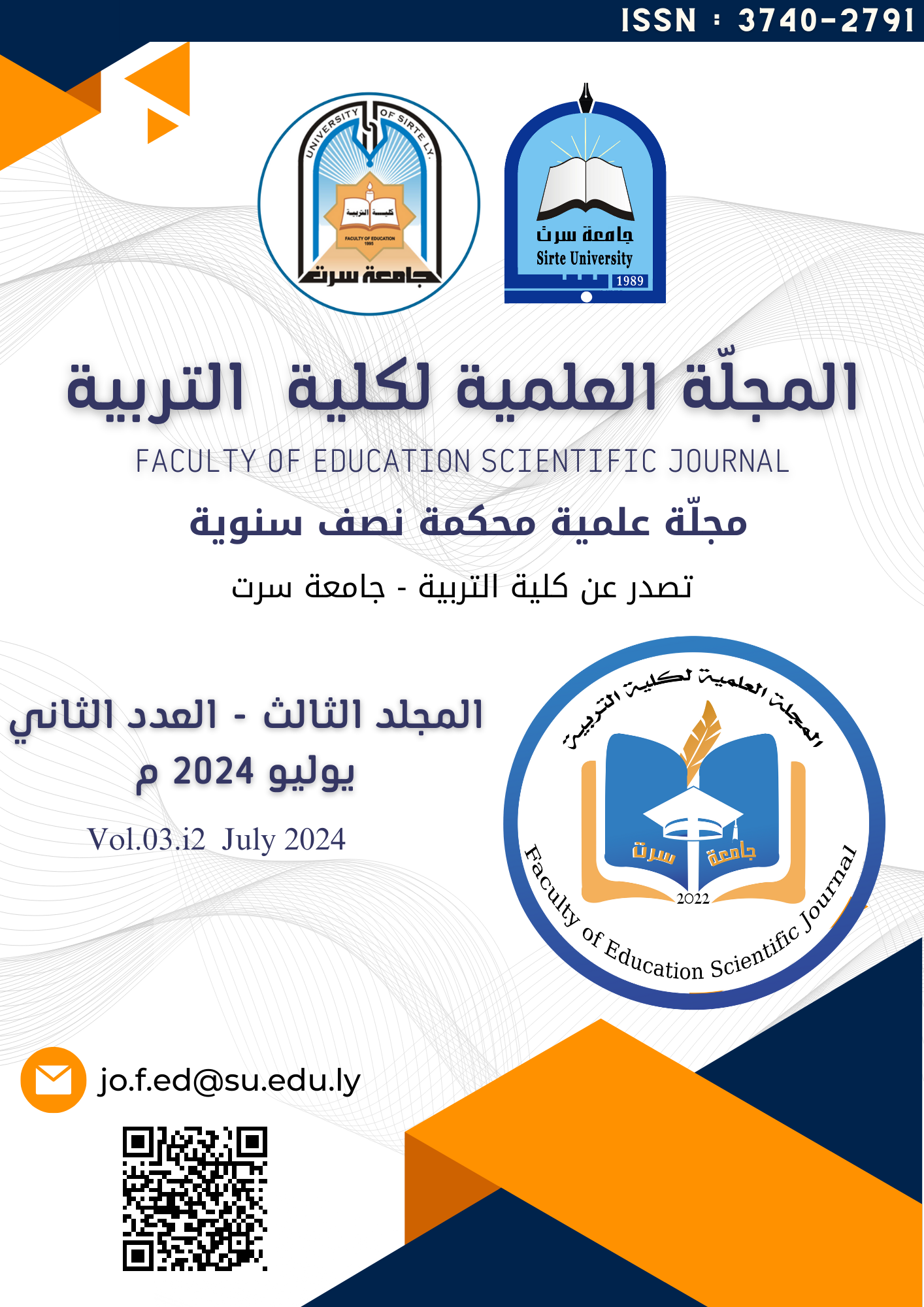Enhancing English Language Learning in Libyan Primary Schools through Gamification: Guidelines Development
DOI:
https://doi.org/10.37375/foej.v3i2.2829Keywords:
Gamification, Guideline, English Language Learning, Primary SchoolAbstract
: The English language is widely recognized as a global language, playing a pivotal role in various domains such as education, and business. However, there is a lack of guidelines specifically tailored to measure the effect of gamification on English language learning among Libyan primary school students. This study aims to develop guidelines using a building and evaluating method. To establish these guidelines, the most commonly used and important factors were collected, and expert validation was performed to ensure the validity of these factors. The results confirmed that factors such as motivation, engagement, performance, and participation are valid and can be effectively employed for measuring the impact of gamification on English language learning among Libyan primary school students. The developed guidelines, based on identified factors and expert validation, serve as a valuable resource for educators and researchers seeking to leverage gamification in the pursuit of improved English language proficiency among Libyan primary school students.
References
Ahmed, H. (2016). Duolingo as a Bilingual Learning App: a Case Study. Arab World English Journal, 7(2), 255–267. doi: 10.24093/awej/vol7no2.17
Ajisoko, P. (2020). The use of duolingo apps to improve English vocabulary learning. International Journal of Emerging Technologies in Learning, 15(7), 149–155. doi: 10.3991/IJET.V15I07.13229
Alshammari, M. T. (2020). Evaluation of gamification in e-learning systems for elementary school students. TEM Journal, 9(2), 806–813. doi: 10.18421/TEM92-51
Anton Adi Purwanto, & Syafryadin. (2023). Students’ Perception on Using Duolingo for Learning English Vocabulary. JET (Journal of English Teaching), 9(1). doi: 10.33541/jet.v9i1.4506
Boyinbode, O. (2018). International Journal of Computer Science and Mobile Computing Development of a Gamification Based English Vocabulary Mobile Learning System. In International Journal of Computer Science and Mobile Computing (Vol. 7, Issue 8). Retrieved from www.ijcsmc.com
Dehghanzadeh, H., Fardanesh, H., Hatami, J., Talaee, E., & Noroozi, O. (2021). Using gamification to support learning English as a second language: a systematic review. In Computer Assisted Language Learning (Vol. 34, Issue 7, pp. 934–957). Routledge. doi: 10.1080/09588221.2019.1648298
Dian Anisa, K., Marmanto, S., & Supriyadi, S. (n.d.). The Effect of Gamification on Students’ Motivation in Learning English.
Elaish, M. M., Abdul Ghani, N., & Shuib, L. (2017). MOBILE GAME APPLICATIONS (MGAS) FOR ENGLISH LANGUAGE LEARNING: A GUIDELINE FOR DEVELOPMENT.
Fui-Hoon Nah, F., Zeng, Q., Rajasekhar Telaprolu, V., Padmanabhuni Ayyappa, A., & Eschenbrenner, B. (2014). LNCS 8527 - Gamification of Education: A Review of Literature. In LNCS (Vol. 8527). Retrieved from www.curatr.co.uk
Govender, T., & Arnedo-Moreno, J. (2020). A Survey on Gamification Elements in Mobile Language-Learning Applications. ACM International Conference Proceeding Series, 669–676. doi: 10.1145/3434780.3436597
Govindarajan, R. (2021). Exploiting Gamification and Interactive Activities to Achieve Better Students’ Engagement in ELT Classes. Arab World English Journal, 2, 238–251. doi: 10.24093/awej/mec2.17
Hashim, H., Rafiqah M. Rafiq, K., & Md. Yunus, M. (2019). Improving ESL Learners’ Grammar with Gamified-Learning. Arab World English Journal, 5, 41–50. doi: 10.24093/awej/call5.4
Irawan, A., Wilson, A., & Sutrisno, S. (2020). The Implementation of Duolingo Mobile Application in English Vocabulary Learning. Scope : Journal of English Language Teaching, 5(1), 08. doi: 10.30998/scope.v5i1.6568
Khowaja, K., & Salim, S. S. (2015). Heuristics to evaluate interactive systems for children with Autism Spectrum Disorder (ASD). PLoS ONE, 10(7). doi: 10.1371/journal.pone.0132187
Mee Mee, R. W., Shahdan, T. S. T., Ismail, M. R., Abd Ghani, K., Pek, L. S., Von, W. Y., Woo, A., & Rao, Y. S. (2020). Role of gamification in classroom teaching: Pre-service teachers’ view. International Journal of Evaluation and Research in Education, 9(3), 684–690. doi: 10.11591/ijere.v9i3.20622
Mustafa, M., & Elaish, A. (2019). Mobile game application framework with persuasive technology for learning english vocabulary among primary school students.
Prabawa, H. W. (2017). A Review of Gamification in Technological Pedagogical Content Knowledge. Journal of Physics: Conference Series, 812(1). doi: 10.1088/1742-6596/812/1/012019
Putu Wulantari, N., Rachman, A., Nurmalia Sari, M., Jola Uktolseja, L., Rofi, A., Saraswati Tabanan, I., Pahlawan No, J., Peken, D., Tabanan, K., Tabanan, K., Halu Oleo, U., Hijau Bumi Tridharma, K., Kambu, K., Kendari, K., Tenggara, S., Muhammadiyah Sungai Penuh, S., Martadinata No, J. R., Sungai Penuh, P., Sungai Penuh, K., & Sungai Penuh, K. (n.d.). The Role Of Gamification In English Language Teaching: A Literature Review. Journal on Education, 06(01).
Shortt, M., Tilak, S., Kuznetcova, I., Martens, B., & Akinkuolie, B. (2023). Gamification in mobile-assisted language learning: a systematic review of Duolingo literature from public release of 2012 to early 2020. Computer Assisted Language Learning, 36(3), 517–554. doi: 10.1080/09588221.2021.1933540
Tamtama, G. I. W., Suryanto, P., & Suyoto. (2020). Design of english vocabulary mobile apps using gamification: An Indonesian case study for kindergarten. International Journal of Engineering Pedagogy, 10(1), 105–162. doi: 10.3991/ijep.v10i1.11551









